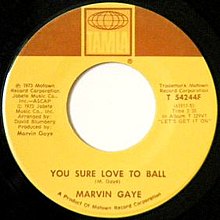
Marvin Pentz Gay Jr., who also spelled his surname as Gaye, was an American singer and songwriter. He helped to shape the sound of Motown in the 1960s, first as an in-house session player (Drums) and later as a solo artist with a string of successes, earning him the nicknames "Prince of Motown" and "Prince of Soul".

What's Going On is the eleventh studio album by American soul singer Marvin Gaye. It was released on May 21, 1971, by the Motown Records subsidiary label Tamla. Recorded between 1970 and 1971 in sessions at Hitsville U.S.A., Golden World, and United Sound Studios in Detroit, and at The Sound Factory in West Hollywood, California, it was Gaye's first album to credit him as a producer and to credit Motown's in-house studio band, the session musicians known as the Funk Brothers.

Let's Get It On is the thirteenth studio album by American soul singer, songwriter, and producer Marvin Gaye. It was released on August 28, 1973, by the Motown subsidiary label Tamla Records on LP.

"What's Going On" is a song by American singer-songwriter Marvin Gaye, released in 1971 on the Motown subsidiary Tamla. Originally inspired by a police brutality incident witnessed by Renaldo "Obie" Benson, the song was composed by Benson, Al Cleveland, and Gaye and produced by Gaye himself. The song marked Gaye's departure from the Motown Sound towards more personal material. Later topping the Hot Soul Singles chart for five weeks and crossing over to number two on the Billboard Hot 100, it would sell over two million copies, becoming Gaye's second-most successful Motown song to date. It was ranked at number 4 in Rolling Stone's 500 Greatest Songs of all Time in 2004 and 2010.
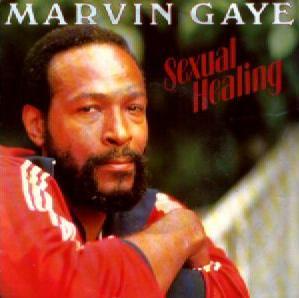
"Sexual Healing" is a song recorded by American singer Marvin Gaye from his seventeenth and final studio album, Midnight Love (1982). It was his first single since his exit from his long-term record label Motown earlier in the year, following the release of the In Our Lifetime (1981) album the previous year. It peaked at No. 3 on the Billboard Hot 100 and is listed at number 198 on Rolling Stone's list of 500 Greatest Songs of All Time. "Sexual Healing" is written and composed in the key of E-flat major and is set in time signature of 4/4 with a tempo of 94 beats per minute.

"Let's Get It On" is a song by soul musician Marvin Gaye, released June 15, 1973, on Motown-subsidiary label Tamla Records. The song was recorded on March 22, 1973, at Hitsville West in Los Angeles, California. The song features romantic and sexual lyricism and funk instrumentation by The Funk Brothers. The title track of Gaye's album of the same name, it was written by Marvin Gaye and producer Ed Townsend. "Let's Get It On" became Gaye's most successful single for Motown and one of his most well-known songs. With the help of the song's sexually explicit content, "Let's Get It On" helped give Gaye a reputation as a sex symbol during its initial popularity. "Let's Get It On" is written and composed in the key of E-flat major and is set in time signature of common time with a tempo of 82 beats per minute.
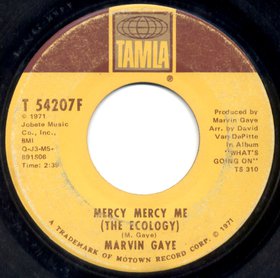
"Mercy Mercy Me (The Ecology)" is the second single from American singer-songwriter Marvin Gaye's 1971 album, What's Going On. Following the breakthrough of the title track's success, the song, written solely by Gaye, became regarded as one of popular music's most poignant anthems of sorrow regarding the environment. Led by Gaye playing piano, strings conducted by Paul Riser and David Van De Pitte, multi-tracking vocals from Gaye and the Andantes, multiple background instruments provided by the Funk Brothers and a leading sax solo by Wild Bill Moore, the song rose to number 4 on Billboard's Pop Singles chart and number one for two weeks on the R&B Singles charts on August 14 through to August 27, 1971. The distinctive percussive sound heard on the track was a wood block struck by a rubber mallet, drenched in studio reverb. The song also brought Gaye one of his rare appearances on the Adult Contemporary chart, where it peaked at number 34. In Canada, "Mercy Mercy Me" spent two weeks at number 9.

"I Want You" is a song written by songwriters Leon Ware and Arthur "T-Boy" Ross and performed by singer Marvin Gaye. It was released as a single in 1976 on his fourteenth studio album of the same name on the Tamla label. The song introduced a change in musical styles for Gaye, who before then had been recording songs with a funk edge. Songs such as this gave him a disco audience thanks to Ware, who produced the song alongside Gaye.

"You're All I Need to Get By" is a song recorded by the American R&B/soul duo Marvin Gaye and Tammi Terrell and released on Motown Records' Tamla label in 1968. It was the basis for the 1995 single "I'll Be There for You/You're All I Need to Get By" from Method Man and Mary J. Blige.

"Ain't Nothing Like the Real Thing" is a 1968 single released by American R&B/soul duo Marvin Gaye and Tammi Terrell, on the Tamla label in 1968. The B-side of the single is "Little Ole Boy, Little Ole Girl" from the duo's United LP. The first release off the duo's second album: You're All I Need, the song—written and produced by regular Gaye/Terrell collaborators Ashford & Simpson—became a hit within weeks of release eventually peaking at number eight on the US Billboard Hot 100 and number one on the Hot Soul Singles chart, the first of the duo's two number-one R&B hits. In the UK "Ain't Nothing Like the Real Thing" reached number 34.

I Want You is the fourteenth studio album by American soul singer and songwriter Marvin Gaye. It was released on March 16, 1976, by the Motown Records-subsidiary label Tamla.
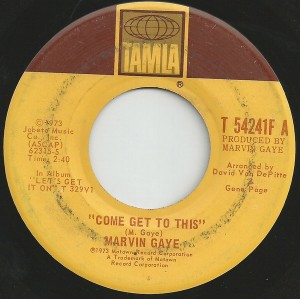
"Come Get to This" is a song written and recorded by American recording artist Marvin Gaye. It was released as the second single off Gaye's album, Let's Get It On following the success of the title track. Recording sessions for the song first occurred in 1970 when Gaye worked on the song in a demo format while he made What's Going On.
"Just to Keep You Satisfied" is a song by soul singer Marvin Gaye. The song was the b-side to Marvin's modest 1974 hit, "You Sure Love to Ball" and was the eighth and final song issued on the singer's 1973 album, Let's Get It On.

Diana & Marvin is a duets album by American soul musicians Diana Ross and Marvin Gaye, released October 26, 1973 on Motown. Recording sessions for the album took place between 1971 and 1973 at Motown Recording Studios in Hollywood, California. Gaye and Ross were widely recognized at the time as two of the top pop music performers.
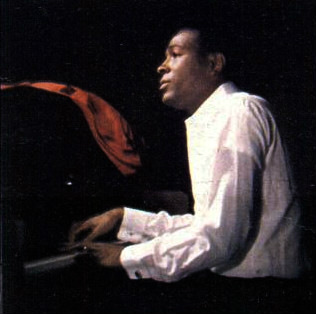
American music artist Marvin Gaye released 25 studio albums, four live albums, one soundtrack album, 24 compilation albums, and 83 singles. In 1961 Gaye signed a recording contract with Tamla Records, owned by Motown. The first release under the label was The Soulful Moods of Marvin Gaye. Gaye's first album to chart was a duet album with Mary Wells titled Together, peaking at number forty-two on the Billboard pop album chart. His 1965 album, Moods of Marvin Gaye, became his first album to reach the top ten of the R&B album charts and spawned four hit singles. Gaye recorded more than thirty hit singles for Motown throughout the 1960s, becoming established as "the Prince of Motown". Gaye topped the charts in 1968 with his rendition of "I Heard It Through the Grapevine", while his 1969 album, M.P.G., became his first number one R&B album. Gaye's landmark album, 1971's What's Going On became the first album by a solo artist to launch three top ten singles, including the title track. His 1973 single, "Let's Get It On", topped the charts while its subsequent album reached number two on the charts becoming his most successful Motown album to date. In 1982, after 21 years with Motown, Gaye signed with Columbia Records and issued Midnight Love, which included his most successful single to date, "Sexual Healing". Following his death in 1984, three albums were released posthumously while some of Gaye's landmark works were re-issued.

"Your Unchanging Love" is a 1967 single released by American soul singer Marvin Gaye on the Tamla label.
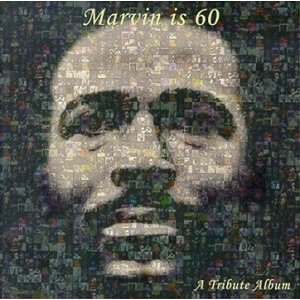
Marvin Is 60: A Tribute Album is the second tribute album dedicated to Motown recording artist Marvin Gaye, released by Motown in 1999. The album featured covers of Gaye's hits including "Sexual Healing", "Your Precious Love" and "Distant Lover". Artists such as Erykah Badu, D'Angelo, El DeBarge, Chico DeBarge, Joe, Brian McKnight and Gerald Levert took part in paying tribute to Gaye, all of whom considered the singer one of their biggest influences. The album peaked at number 97 on the Billboard Top 200 and number 20 on the Billboard R&B chart and released the cover versions of "Your Precious Love" and "You Sure Love to Ball" as singles.

"How Sweet It Is (To Be Loved by You)" is a song recorded by American soul singer Marvin Gaye from his fifth studio album of the same name (1965). It was written in 1964 by the Motown songwriting team of Holland–Dozier–Holland, and produced by Brian Holland and Lamont Dozier. The song title was inspired by one of the actor and comedian Jackie Gleason's signature phrases, "How Sweet It Is!"
Nona Aisha Gaye is an American singer, former fashion model, and retired actress. The daughter of singer Marvin Gaye and maternal granddaughter of jazz musician Slim Gaillard, Gaye began her career as a vocalist in the early 1990s. As an actress, Gaye is best known for her portrayal of Zee in the 2003 science-fiction films The Matrix Reloaded and The Matrix Revolutions.
